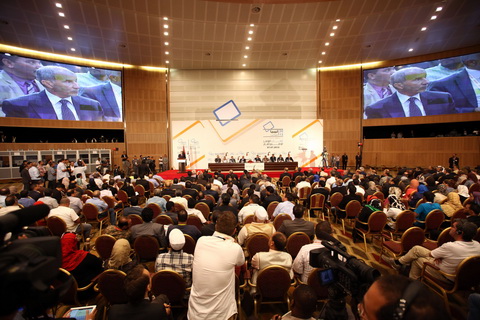
(AFP/File, William Lloyd-George)
A meeting between water ministers from Egypt, Sudan, and Ethiopia failed to produce the committee that it had aimed to put in place to supervise Ethiopia’s Grand Renaissance Dam.
A tripartite panel of experts had investigated the dam and presented recommendations to the three countries affected by the Ethiopian construction project.
Egyptian Minister of Water and Irrigation Mohamed Abdel Moteleb rejected the notion that the meeting between the countries had “failed,” saying such negotiations would need time and would not come to a quick conclusion. Abdel Moteleb also blamed a national dialogue held by former president Mohamed Morsi, which was broadcasted live, unbeknownst to some participants who suggested secret intelligence operations to undermine the Ethiopian government. The “scandal,” said the minister, dominated the meeting between the three countries and caused a delay in negotiations and required Abdel Moteleb and his delegation to clarify the stance of the interim government on the issue.
Following the return of the Egyptian delegation to Cairo, it was announced that a second round of talks between the ministers would take place in Khartoum on 8 December, in order to implement the recommendations put forth by the Committee of Experts.
Abdel Moteleb said his delegation provided a “comprehensive and clear vision” to the other countries, calling on the need to complete studies of the economic and environmental impacts of the dam.
The minister also stressed the possibility that the three ministers could come to an agreement following the December meeting.
Ethiopian Minister of Water, Irrigation, and Energy Alamayo Tegno said the postponed meeting was due to differences among the three sides, but also stated that he was optimistic that a solution would be reached, according to the Sudan Tribune.
Abdel Moteleb had previously expressed optimism that the three countries could coordinate in handling the dam, which would potentially affect the upstream countries of Sudan and Egypt.



